
Annemieke Van Dam
(DipCAH, RSH.DipPH, WCA Cert. Wellness Coaching)
Note — The article was checked and updated May 2024.
Hypnosis is a mental state of highly focused concentration, diminished peripheral awareness, and heightened suggestibility.
This makes it beneficial for assisting a range of physical and mental health conditions including pain, anxiety and mood disorders. Also, it has been used as an alternative to anaesthesia since the 1990s.[1,2]
While it works well as a stand-alone treatment, hypnotherapy benefits can be enhanced when utilised in combination with other forms of therapy.
Addictions
Addictions are commonly attributed to alcohol, drugs, and smoking but can also extend to other areas, such as gambling and sex.
Hypnotherapy can help individuals to strengthen their willpower in overcoming addictive urges and cravings. This enables patterns and conditioning related to thinking and behaviour to be rewired.[4]
Substance abuse studies have concluded that combining 20 intense daily treatments with hypnosis can have up to 77% success rate in preventing further substance use.[5]
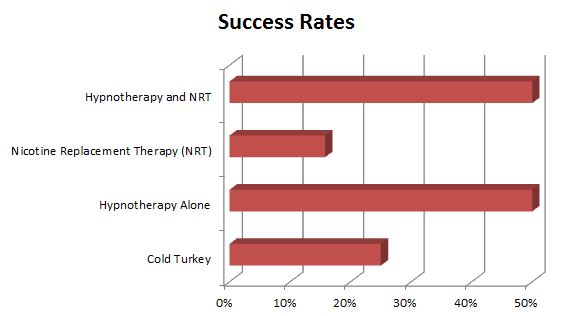
A literature review published in the International Journal of Clinical and Experimental Hypnosis analyzed 59 studies on hypnosis and smoking cessation, and concluded that hypnosis was equally successful to other smoking-cessation methods.
RELATED — Anxiety and Smoking: How it affects our Mental Health
When treating substance abuse, hypnosis is often combined with other therapies such as cognitive behavioural therapy so it is difficult to determine the effectiveness of hypnosis alone indicating that more research needs to be done.[6,7]
Brain health
Studies have indicated that hypnotherapy can help with brain health for brain-centred conditions.
Examples include
- Parkinson’s
- multiple sclerosis (MS)
- speech impediments
- headaches
- migraines
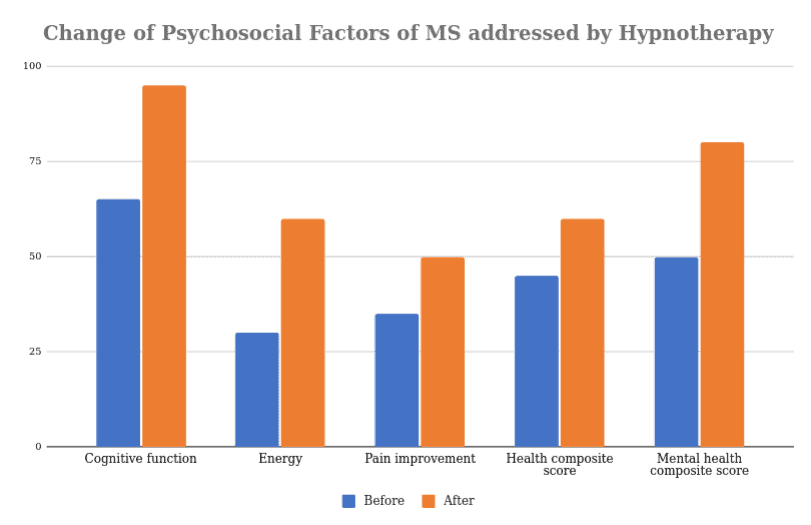
A case study, conducted by Eva Clark showed that hypnotherapy may provide relief of both physical and mental symptoms related to MS, and increase patients’ quality of life.[8]
Hypnotherapy may provide relief to individuals with multiple sclerosis
Hypnosis is also viable for people with Parkinson’s disease, helping to reduce and sometimes eliminate associated
- stiffness
- shakiness
- slowness
- pain
- fear
- anxiety
- dementia
- sleeplessness
A study conducted by the National Institute of Health (part of the US Department of Health and largest biomedical research agency in the world), found that daily sessions of hypnosis were beneficial in reducing tremors in the patient.[9]
Hypnosis can also be used to help with headaches and migraines, as well as stammer and other speech impediments.[10,11]
Cardiovascular health
Hypnosis for heart disease is effective in reducing symptoms of
- anxiety and depression
- perceived stress
- blood pressure
- body mass index (in people with chronic heart disease)
Studies show that positive emotions lead to alterations in heart rate variability, which may be beneficial in the treatment of hypertension and in reducing the likelihood of sudden death in patients with congestive heart failure and coronary artery disease.[12]
Gastrointestinal health
Hypnotherapy has been proven to be highly effective for treating gastrointestinal (GI) disorders.
There are presently 35 studies in the published empirical literature, including 17 randomised controlled trials (RCTs) that have assessed clinical outcomes of such treatment.
Twenty-four of the studies have tested hypnotherapy for adult irritable bowel syndrome (IBS) and 5 have focused on IBS or abdominal pain in children.
IBS hypnotherapy studies report significant improvement in GI symptoms
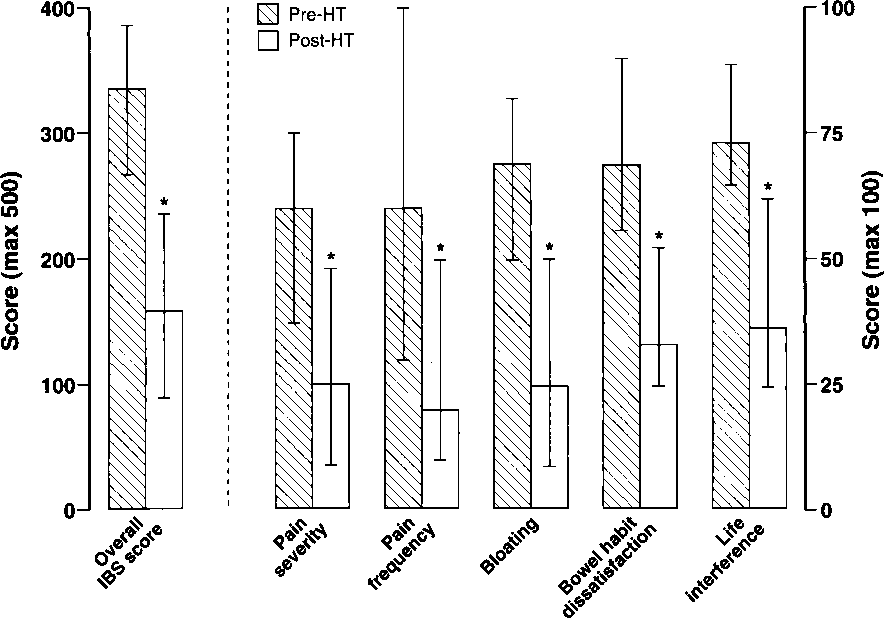
Source: Houghton, L. Hypnotherapy in irritable bowel syndrome: a large-scale audit of a clinical service with examination of factors influencing responsiveness. (2002)
Collectively this body of research shows that for both adults and children with IBS, hypnosis treatment is highly efficacious.
It can also offer lasting and substantial symptom relief for a large proportion of patients who do not respond adequately to usual medical treatment approaches.
For other GI disorders the evidence is more limited, but preliminary indications from randomised controlled trials suggest hypnotherapy can aid
- Functional dyspepsia
- Functional chest pain
- Ulcerative colitis
Mental health
Hypnosis provides individuals with the internal tools needed to overcome the unhelpful emotions and behaviours.
RELATED — Introduction to Hypnotherapy: Mind-Body Intervention Technique
Hypnotherapy has been shown to support overall mental health and enhance well-being and life quality by
- self-esteem and confidence building
- positive thinking
- stress reduction
- motivation and focus on achieving goals
- problem-solving
- reducing negative self-talk
- overcoming self-limiting beliefs
Hypnotherapy helps anxiety-related issues and depression
Studies show that cognitive behaviour therapy (CBT) provides an effective complement to hypnosis treatment for conditions such as acute stress disorder.
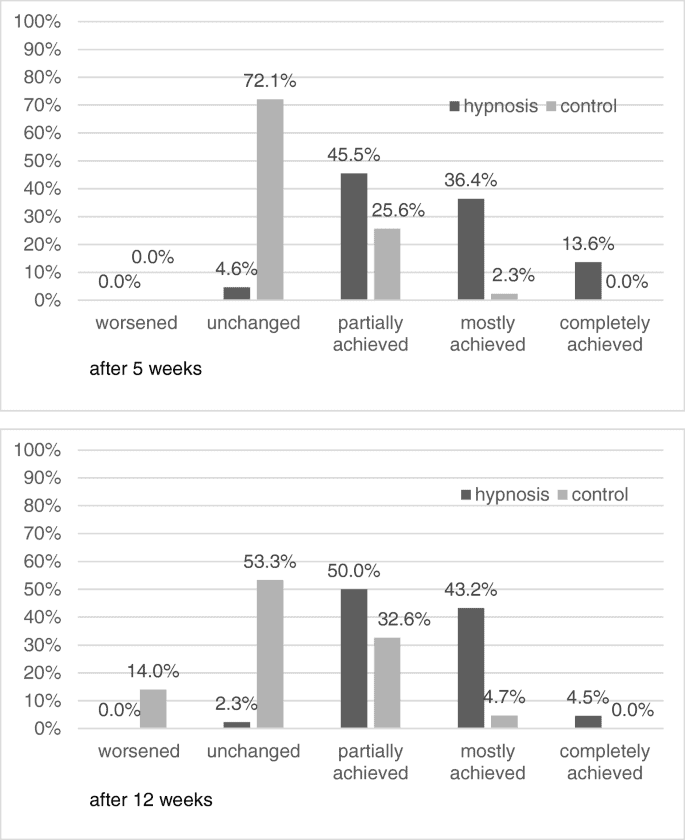
Source: Fisch, S., Thiel, S. Group hypnosis for stress reduction and improved stress coping: a multicenter randomized controlled trial. (2020)
Though it does not promise a complete cure in all cases, hypnosis can have a significant and long-lasting positive effect on behaviour and thought modification.[14]
Main benefits of hypnosis for anxiety and depression are that it
- allows patients to remain emotionally balanced
- increases patients’ ability to focus during stressful situations
- helps patients detach from bad habits and obsessive or destructive behaviours
- encourages a more positive worldview
- allows patients to feel more in control of their life
- forms new conditions for personal empowerment[15]
Hypnotherapy and training in self-hypnosis can also help with phobias and post-traumatic stress disorders (PTSD).
With the use of hypnosis PTSD patients face and bear a traumatic experience by embedding it in a new context, acknowledging helplessness during the event. Then, they provide a controlled access to memories which are then placed into a broader perspective.
PTSD patients can also be taught self-hypnosis techniques that allow them to work through traumatic memories and thereby reduce intrusive and unwanted negative thoughts.[16]
Pain management
Hypnosis can give immediate pain relief in good hypnotic individuals, with it being effective in an emergency or when a patient is undergoing surgical, medical, or dental intervention.
It can also be helpful for acute pain or as a part of pain management for chronic pain. Evidence suggests that the best analgesic effects for experimental pain are obtained by hypnosis in good hypnotic individuals.[17]
The effectiveness of hypnosis is supported by the Arthritis Foundation who suggest that hypnosis can be a helpful non-drug therapy to reduce pain in arthritis and fibromyalgia.
RELATED — What are the first signs and symptoms of fibromyalgia
Studies show more than 75% of people with arthritis and related diseases experience significant pain relief using hypnosis.[18,19]
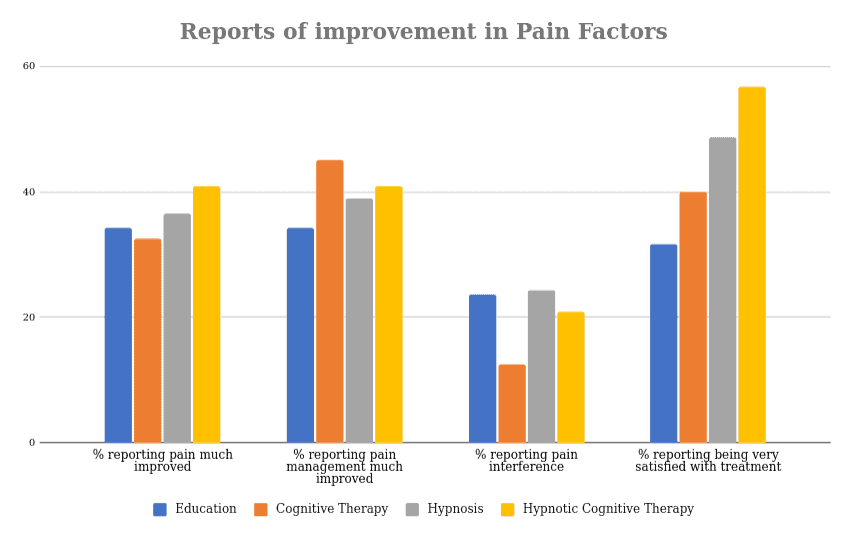
Some individuals can virtually obliterate perception of pain and appear to absorb themselves in other cognitive activity such as pleasant images and can also ignore painful sensations.[20]
For chronic pain sufferers, along with hypnotherapy, treatment may need to include a range of lifestyle aspects such as
- physical and mental activities
- general health and sleep
- use of medication
- relationships and self-esteem
- anger management[21]
Respiratory health
Hypnotherapy has been shown to help with respiratory symptoms such as chronic obstructive pulmonary disease (COPD).
A single hypnosis session showed reduced anxiety and improved breathing mechanics in COPD patients.[22]
Hypnosis has also been reported to help with psychosocial treatment related to respiratory issues such as asthma.[22]
Hypnosis should not be the sole treatment for acute asthma attacks
Hypnosis can be used effectively to treat asthma when it complements other forms of medical treatment. It can bring on a calming effect that can help to reduce hyperventilation, and reduce the perception of tightness and wheezing.[21]
RELATED — Natural remedies: For our respiratory health (sinuses, throat and lungs)

Psychogenic Asthma Patients. (2021)
A study reported in 1988 concluded that 16 chronic asthma patients who were inadequately controlled by the medical drugs had a fall in admissions from 44 to 13 after one year of hypnotherapy.[22]
Sexual health
Hypnosis can help with common sexual issues such as
- low or impaired sexual drive
- impaired sexual arousal, including erectile dysfunction
- lack of vaginal lubrication or inability to penetrate the vagina due to pelvic muscle spasm
- orgasmic problems
- premature or retarded ejaculation
Medical testing is advised prior to commencing hypnotherapy.
Application of hypnotherapy to the treatment of sexual dysfunction, compared to psychotherapy, is a much quicker treatment route. Some research concluded that hypnotherapy offers a rapid and cost-effective form of treatment for sexual disorders.[23]
However, more reliable research is needed in order to reach solid conclusions about the extent of outcomes of hypnosis for sexual dysfunctions.
Skin and epidermis health
Hypnosis can help treat skin conditions such as eczema or psoriasis, and can also speed up the healing of wounds.
It can aid in three distinct ways, which are
- addressing the core of the issue
- examining the remission of symptoms
- changing the conditioned response[24]
Hypnosis induction techniques for skin conditions are done for relaxation, to reduce pain or pruritus, or to modify a habit to assist healing.
Hypnosis can be used to help specific issues relating to your skin such as:
- Reducing scratching
- Relieving pain
- Controlling habits such as picking, or touching the skin
- Calming down redness
- Helping the skin to heal
But it can also be used to help you with broader issues that might be related to skin problems. These may include:
- Increasing your immune system
- Stress and anxiety relief
- Boosting your confidence and self-esteem
- Helping to lift low mood[24]
This was confirmed by Adam Eason who suggests that hypnosis has been used to help deal with and overcome allergic reactions and has proven to be successful in lessening sensitivity of the skin and the reactions to allergens.[25]
Sleep disorders
Hypnosis can be a useful tool in enhancing sleep. For people with conditions like insomnia, hypnosis encourages relaxation and creates an opportunity to reorient thoughts and emotions.
Small studies have identified modest sleep benefits from hypnotherapy. In one study, hypnosis prompted increased slow-wave sleep, which is important for physical and mental recovery.[26]
RELATED — Different types of sleep: which one do we need the most?
Hypnotherapy may reduce pain and symptoms of anxiety and depression, all of which are strongly correlated with sleeping problems.[27]
Currently, 58.3% of the studies reported benefits of hypnosis on sleep outcomes, with 12.5% reporting mixed results, and 29.2% reporting no benefits.
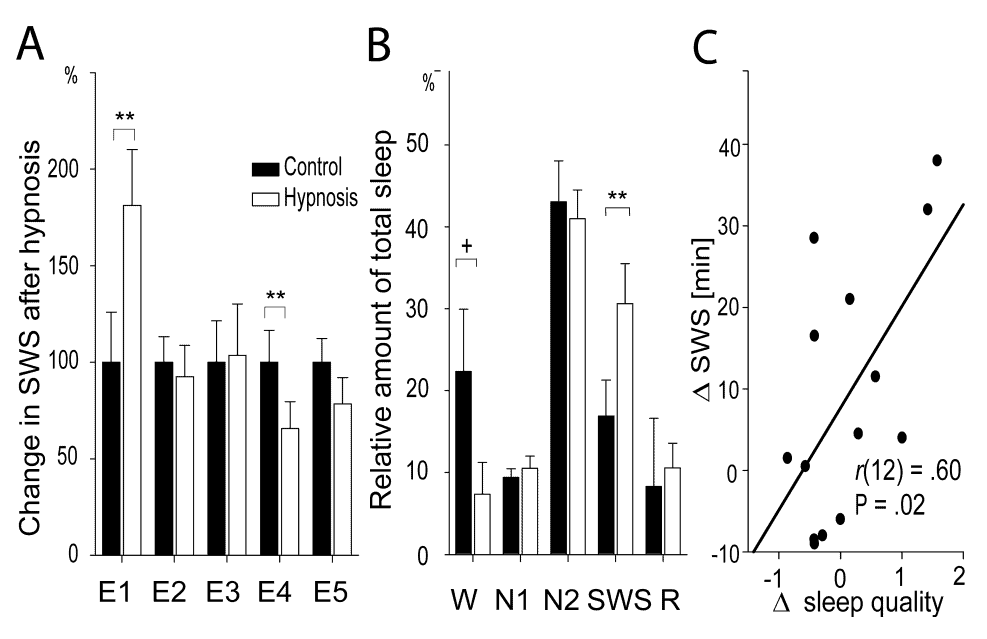
Source: Cordi, M. J. Deepening Sleep by Hypnotic Suggestion.
Another study in a sleep laboratory at the University of Zurich found that slow-wave sleep — a critical component for body restoration and brain plasticity — increased by 81% in people who received hypnosis before sleep.[28]
Slow-wave sleep may increase up to 81% with hypnotherapy
The majority of the existing research reported better sleep in people receiving hypnotherapy, but larger, more robust studies are necessary.
Weight loss and obesity
A 2018 meta-analysis indicates that hypnosis is very effective for short-term weight loss, although the authors acknowledge the lack of research on its long-term effects.
Another 2018 randomised control trial reported that regular self-hypnosis users reduced their calorie intake more significantly and lost more weight than the control group.
Those in the hypnosis group lost an average of 9.6 kilograms over a year compared with 5.6 kg among those in the control group. Individuals who learned how to use hypnosis but did not practise it regularly lost an average of 6.5 kg.[29]
Also, in one study researchers reported an increase in physical activity among the individuals who used hypnotherapy.
Although evidence suggests that hypnosis may provide short-term benefits for weight loss, more research is necessary on the long-term effects of hypnosis as a possible treatment for obesity.[30]
Cancer care
The effect of hypnotherapy on cancer needs more research.
However, it has been concluded that hypnotherapy helps with the negative experiences associated with cancer treatments. This is because the majority of cancer patients experience
- stress
- anxiety
- depression
- fear
- nausea
- vomiting
- fatigue
- pain
which is where sessions with a hypnotherapist can assist to alleviate the negative effects of radiotherapy, chemotherapy and surgery on mental health.
Hypnotherapy can also help with mitigating negative emotions, ego-strengthening, motivation, and guided healing imagery.[31,19]
A review of research has concluded that hypnotherapy seems to improve the mental health as well as physical health in cancer patients although more studies are needed to confirm the observed advantages of hypnosis in the field of oncology.
Related Questions
1. Could hypnosis help me give up smoking?
Hypnotherapy helps individuals cease the habit of inhaling substances from cigarettes, cigars, vaping, and cannabis.
The largest ever study into smoking cessation methods shows that hypnosis is six times more effective than willpower alone.[32]
2. Are there any drawbacks of hypnotherapy?
Hypnosis cannot be “done” to you. It will not work if you are not willing or focused on healing.
You are responsible for participating in the process and dedicating the time and space needed to practise self-hypnosis by yourself.
Also, hypnosis is not a quick fix. It usually requires 4-6 sessions to create lasting change. In the case of chronic disease 12-24 sessions may be required.
For more articles on hypnotherapy, please see our section on Mental Health. Also, are you currently thinking of quitting smoking or would like to lose some weight – let us know in the comments below if you tried self-hypnosis and if it’s working for you.
Annemieke is the founder of Livewell Hypnotherapy, and is a hypnotherapist and life and wellness coach operating onsite and online, New Zealand wide and internationally. Prior to becoming a hypnotherapist, Annemieke was a manager, advisor and consultant working in the corporate, education and local government sectors in the areas of health, safety and wellbeing…
If you would like to learn more about Annemieke, see Expert: Annemieke Van Dam.
References
(1) American Psychological Association. (2020). Hypnosis. Retrieved from https://www.apa.org/topics/psychotherapy/hypnosis
(2) Millinget. Al., Milling, L. S., Valentine, K. E., McCarley, H. S., & Lostimolo, L. M. (2018). A meta-analysis of hypnotic interventions for depression symptoms: High hopes for hypnosis? American Journal of Clinical Hypnosis,61(3), 227-243.
(3) Sutton, J. (2021). Does Hypnotherapy Really work? 10+ Scientific Findings. Retrieved from https://positivepsychology.com/hypnotherapy/
(4) Natural Therapy pages (nd) Hypnotherapy for Addiction. Retrieved from https://www.naturaltherapypages.co.nz/article/Hypnotherapy_for_Addiction
(5) Potter, G. (2004). Intensive therapy: utilizing hypnosis in the treatment of substance abuse disorders. Retrieved from https://pubmed.ncbi.nlm.nih.gov/15376606/
(6) Smith, B.L. (2011). Hypnosis Today. Retrieved from https://www.apa.org/monitor/2011/01/hypnosis
(7) Sawni A., & Breuner, CC. (2017). Clinical Hypnosis, an Effective Mind-Body Modality for Adolescents with Behavioral and Physical Complaints. Children (Basel). 4(4):19. Retrieved from https://www.ncbi.nlm.nih.gov/pmc/articles/PMC5406678/
(8) Mind Based healing, (nd). Hypnosis for Multiple Sclerosis – an Alternative Therapy for MS. Retrieved from https://mindbasedhealing.org/hypnosis-multiple-sclerosis/
(9) Wain, H. J. (1990). The effects of hypnosis on a parkinsonian tremor: case report with polygraph/EEG recordings.
(10) Anbar, R. D. (2007). Treatment of headaches with hypnosis. Retrieved from https://www.psychologytoday.com/us/blog/understanding-hypnosis/202204/treatment-headaches-hypnosis
(11) Elkins, G., Sliwinski, J., Bowers, J., Encarnacion, E. (2013). Feasibility of Clinical Hypnosis for the Treatment of Parkinson’s Disease – a case study.
(12) Moore, R. (2015). Hypnosis for heart disease. Retrieved from https://hypnosishealthinfo.com/hypnosis-heart-disease/
(13) Palsson, O. (2015). Hypnosis Treatment of gastrointestinal disorders: A Comprehensive Review of the Empirical Evidence.
(14) Cognitive healing. (2021). Benefits of hypnosis for anxiety and depression. Retrieved from https://www.cognitivehealing.com/depression/key-benefits-of-hypnosis-for-anxiety-and-depression
(15) Smith, W. H. (1990). Hypnosis in the treatment of anxiety.
(16) Spiegel, D., & Cardena, E. (1990). New uses of hypnosis in the treatment of post traumatic stress disorder.
(17) Eastwood J. D., Gaskovski P., Bowers K. (1998). The folly of effort: Ironic effects in the mental control of pain. International Journal of Experimental Hypnosis 46: 77-91
(18) Arthritis Foundation (nd). Hypnosis for pain relief. Retrieved from https://www.arthritis.org/health-wellness/treatment/complementary-therapies/natural-therapies/hypnosis-for-pain-relief
(19) Jensen, M.P., Mendoza, M.E., Ehde, D.M., Patterson, D.R., Molton, I.R., Dillworth, T.M., Gertz, C.J., Hakimian, S., Battalio, S.L., Ciol, M.A. (2020) Effects of Hypnosis, cognitive therapy, hypnotic cognitive therapy and pain education in adults with chronic pain: a clinical trial. Retrieved from https://www.ncbi.nlm.nih.gov/pmc/articles/PMC7508809/
(20) Crawford, H. J. (1994). Brain Dynamics and Hypnosis: attentional and disattentional processes. International Journal of Clinical and Experimental Hypnosis 42: 204-232
(21) Heap M., Aravind K., K. (2001). Hartland’s Medical and Dental Hypnosis. Churchill Livingstone.
(22) Morrison, J. B. (1988). Chronic asthma and improvement with relaxation induced by hypnotherapy.
(23) Tannous, A. (2021) Hypnosis: Hypnotherapy and sexual dysfunction. Retrieved from https://www.ishhypnosis.org/hypnosis-hypnotherapy-and-sexual-dysfunction/
(24) Wu, B., Eighblawi, E. (2018) Hypnosis as a treatment for skin disorders. Retrieved from https://dermnetnz.org/topics/hypnosis-as-a-treatment-for-skin-disorders
(25) Eason, A. (2013). (Fry, L. Et al., Effects of Hypnosis on allergic skin responses in asthma and hayfever. British Medical Journal, 1:1145-1148. Retrieved from https://www.adam-eason.com/the-evidence-for-using-hypnosis-with-skin-disorders/
(26) Beck, J., Cordi, M.J., Rusch, B., (2021). Hypnotic Suggestions Increase Slow-Wave Parameters but Decrease Slow-Wave Spindle Coupling. Retrieved from https://www.dovepress.com/hypnotic-suggestions-increase-slow-wave-parameters-but-decrease-slow-w-peer-reviewed-fulltext-article-NSS
(27) Chamine, I., Atchley, R., Oken, B.S., (2018). Hypnosis Intervention Effects on Sleep Outcomes: A systematic Review.
(28) Cordi, M.J., Schlarb, A.A., Rasch, B. (2014). Deepening sleep by hypnotic suggestion, Sleep Volume 37, Issue 6. Retrieved from https://academic.oup.com/sleep/article/37/6/1143/2416924
(29) Bo, S., Rahimi, F., Bochetii, S. (2018). Effects of Self-Conditioning Techniques (Self-Hypnosis) in Promoting Weight Loss in Patients with Severe Obesity: A Randomized Controlled Trial. Retrieved from https://onlinelibrary.wiley.com/doi/10.1002/oby.22262
(30) Roslim, N. (2020). Hypnotherapy for overweight and obese patients: A narrative review. Retrieved from https://www.sciencedirect.com/science/article/abs/pii/S2095496420301229#
(31) Sharma, V. (2017). Hypnotherapy in cancer care: Clinical benefits and prospective implications. Retrieved from https://www.jhrr.org/article.asp?issn=2394-2010;year=2017;volume=4;issue=3;spage=96;epage=103;aulast=Sharma
(32) Matthews, R. (1992). How One in Five have given up Smoking. Retrieved from https://www.newscientist.com/article/mg13618450-700-how-one-in-five-have-given-up-smoking






